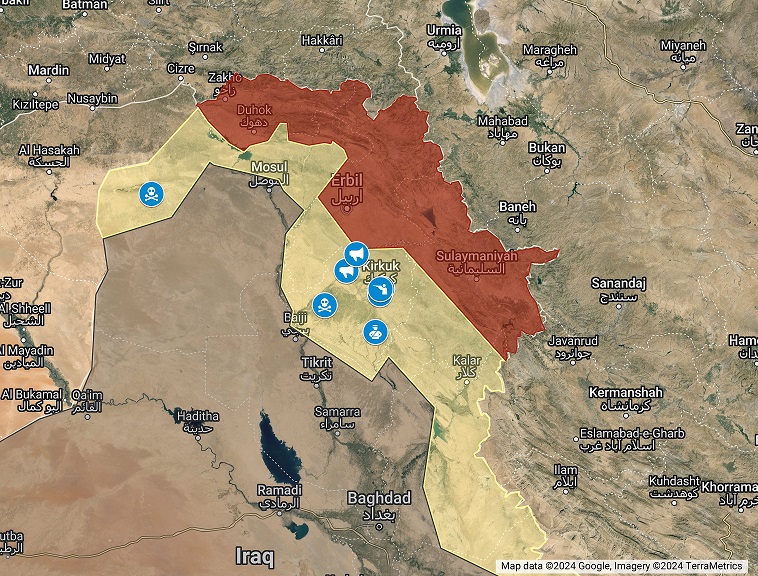1K
A biweekly brief of events and news occurred in the disputed territories.
Kirkuk
- In an armed attack in Kirkuk’s Labor Square, a police officer was killed and another injured. After the attack, the police announced the arrest of the perpetrators, who had robbed a store and shot the police responders. Since October 16, 2017, when the Iraqi government removed the Kurdish security forces, the security situation in the province has deteriorated. Turkish-backed lawmaker Arshad al-Salihi admitted that the province has become a “dumping ground for ISIS, wanted persons, strangers, and terrorist organizations.” Separately, representatives of fifty fallen police families held a press conference, protesting the lack of compensation from local and federal governments. They appealed to the prime minister and the ministry of interior to pursue land compensation for the families of fallen police officers.
- On June 2 a group of settlers raided the Kurdish village of Rizgari in the Daquq district, claiming ownership of hundreds of acres of farmland. The recent attack follows similar raids by settlers in the Dibis and Sargaran districts last month. In 1999, the former Iraqi regime demolished the village and displaced the native Kurds, granting the farmlands to Arab settlers. Since 2005, the new Iraqi government has failed to implement constitutional articles aimed at normalizing the demographic changes imposed by the former regime. Several Kurdish farmers, the original owners of the farmlands, have filed a lawsuit at the Iraqi Supreme Court to annul the laws of the former regime, but the court continues to delay its verdict.
- Nearly six months since the provincial election was held in Kirkuk, the winners have not agreed on forming the local government. On May 29, Iraqi Prime Minister Mohammed Shia al-Sudani chaired a third meeting with the election winners in Baghdad to overcome the deadlock. While the meeting did not resolve the issue, leaked information suggested that al-Sudani gave a two-week deadline for the parties to reach an agreement. Sunni Arab leader of the Arab Coalition, Wasfi al-Asey, raised concerns about the dissolution of the provincial council by law if it exceeds six months without holding any sessions. Al-Asey admitted that “Turkey and Iran are being effective” in pressuring the political parties. This comes as the leader of the Iranian-backed al-Badr Organization, Mohammed al-Bayati, called for a repetition of the election since the political process has reached a deadlock, claiming that the Shia Turkmen have been sidelined.
- Following the May 29 meeting by the prime ministership, the Kurdistan Regional Government (KRG) announced the formation of a committee consisting of several ministers and officials for the disputed territories. The KRG meeting stressed “immediate measures to normalize the current administrative, security, and military situation in the Kurdistani areas and prevent the unacceptable measures of the policy of Arabization.” Separately, the Iraqi Ministry of Planning launched “experimental census activities” ahead of the general census planned for November 20 of this year. The last census in Iraq occurred in 1997 under the former regime. The Kurds in Kirkuk have raised concerns about holding a census at this time since nearly 400,000 displaced people from the Sunni provinces moved to the province in 2005.
- The Department of Mass Graves Affairs and Protection, with supervision from the International Commission on Missing Persons (ICMP), concluded the initial examination of four mass graves in the Haweija district. The four graves are believed to contain the remains of Peshmerga captives taken by ISIS (Da’esh) terrorists from 2014 to 2017.
- For the second month in a row, the Iraqi oil ministry released general statistics of oil exports without revealing details of the revenues and prices per barrel. According to May statistics, Kirkuk’s oil exports reached 448,606 barrels to Jordan. Kirkuk’s oil exports to Turkey via the Ceyhan pipeline remain closed amid talks to resume it in the near future.
Shingal (Sinjar)
- The Department of Mass Graves Affairs and Protection started the excavation of a mass grave near Talafer, which includes 1,500 victims of Da’esh crimes. According to initial results, the remains are those of Yazidi Kurds who suffered genocide at the hands of the terrorist organization in 2014. On June 4, one of the terrorists responsible for killing several Yazidis was executed in Baghdad. Thousands of Yazidis remain missing since the 2014 genocide. Separately, the Nineveh provincial council postponed electing a mayor for the Yazidi town of Shingal. After several failed attempts to reach agreements, six candidates were nominated, but the process was postponed to an unknown date.

